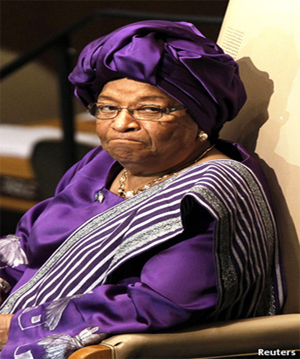Fire 30,000 Of 50,0000 Employees: Good For Profit, Not Liberia |
|---|
By J. Yanqui Zaza
The Perspective
Atlanta, Georgia
November 9, 2014

Fire 30,000 Of 50,0000 Employees: Good For Profit, Not Liberia |
|---|
By J. Yanqui Zaza
The Perspective
Atlanta, Georgia
November 9, 2014
 |
|---|
Ellen Johnson Sirleaf |
Now that we are about to win the Ebola war, where do we go from here? This is a question being asked by many Liberians, including the current Liberian Ambassador accredited to the U.S. Mr. Jeremiah C. Sulunteh. Do we re-renegotiate many of these excessive rental payments made to Monrovia-landlords, such as the $1.5m for Liberian Telecommunication Authority lease? (FrontpageAfrica, 10/15/14). Or do we downsize 30,000 employees of the 50,000 paid employees of the Liberian government?
Of the 195,000 paid employees in Liberia, government employs 50,000 as per page # 40 of the 2010 Labor Survey conducted by Ministry of Labor and Liberia Institute of Statistics and Geo-Information Service. This means the government will dismiss 60% (30,000/50,000) of its paid employees.
At a Senate Hearing to review the Plan to downsize nonessential government employees, requested by Senators Geraldine Doe-Sherriff of Montserrado County and George Tengbeh of Lofa County, Mr. George Werner, Director General of the Civil Service Agency, disclosed that President Sirleaf has decided to downsize about 30,000 non-essential employees beginning in February of 2015. Many Liberians have commented on the Plan of President Sirleaf, a darling of profiteers and a former employee of big business.
The idea of downsizing or rightsizing is an economic policy that increases profits for big business. When businesses cannot increase sale volume or increase selling price, cost cutting is instituted to produce profits. In many instances, cost cutting has made big business appear effective and attractive. Rigidly, recommended by big business or Wall Street, many business tycoons continue to recommend that a bitter medicine such as massive layoff is the only remedy for ailing economies around the world.
For any or all-economic issues, turn to the business people, say business tycoons. New York City did turn to a billionaire without public-office experience Michael Bloomberg, after the September 11, 2001 catastrophic disaster. The success story is mixed, Wall Street went laughing, while public employees are still recovering from stagnation in wages. Liberia did turn to an economist and experienced-business executive, Ellen Johnson Sirleaf to manage Liberia. The Ebola crisis has exposed the true picture of Liberia: poor infrastructure, inadequate skilled manpower, high rate of unemployment, etc., while at the same time Sirleaf’s friends and families are milking the government.
I surely had believed that both New York City and Liberia made the right decision until I read the 11/03/2014 NY Times piece written by Mr. Paul Krugman, an economist and an editorial columnist of the New York Times. In the article called “Business VS. Economics, he said this: “…if you want to fix an ailing economy, you should turn to people who have been successful in business, like leaders of major corporations, entrepreneurs and wealthy investors. After all, doesn’t their success with money mean that they know how the economy really works?”
He said, “Actually no. In fact, business leaders often give remarkably bad economic advice, especially in troubled times.” He went to explain why he thinks so. Firstly, there are business leaders who have gotten economic analysis right, and plenty of public office holders who have gotten it wrong, he added. But having said that, success in business does not seem to convey any special insight into economic policy. Why,” he added. He elaborated on his theory. “National economic policy, even in small countries, needs to take into account kinds of feedback that really matter in business life. For example, even the biggest corporations sell only a small fraction of what they make to their own workers, whereas even small countries sell goods and services to themselves.” Or alternatively, he stated, “…when a successful businessperson looks at a troubled economy and tries to apply the lesson of business experience, …To create jobs, the businessperson thinks, wages must come down, expenses must be reduced; and in general, belts must be tightened.”
In reality, however, cutting wages and reducing spending in a depressed economy just aggravates the real problem. The downsizing and rightsizing in Liberia did not only hurt the economy, but increased disillusionment among the poor. What justified a government paying US $10,000 per month to advisers, but dismissing employees earning US $100 per month? Unlike a corporation that might dissolve or restructure through bankruptcy, the country as well as its citizens must search for other ways, including unsavory means to survive.
Interestingly, President Sirleaf stated that the government is using the principles of austerity to dismiss 30,000 paid employees. If so, why is her government not questioning her son, Robert Sirleaf, about the National Oil Company spending $138M of the $142M oil money as per 2012/2013 National Budget? Or, why spend $64M on foreign travel; according Charles Brumskine, a leader of an opposition party, if a country intends to institute austerity principles? (FrontpageAfrica) More so, why are her advisers squandering government’s money without prosecution? And what’s about the disbursement of the $6M money for Ebola? If the government is serious about instituting the principles of austerity, why not account for the Ebola money? Better yet, the government should begin to re-negotiate many of the rental agreements between the government and the Monrovia-landlords as part of the austerity measures to reduce expenditure.